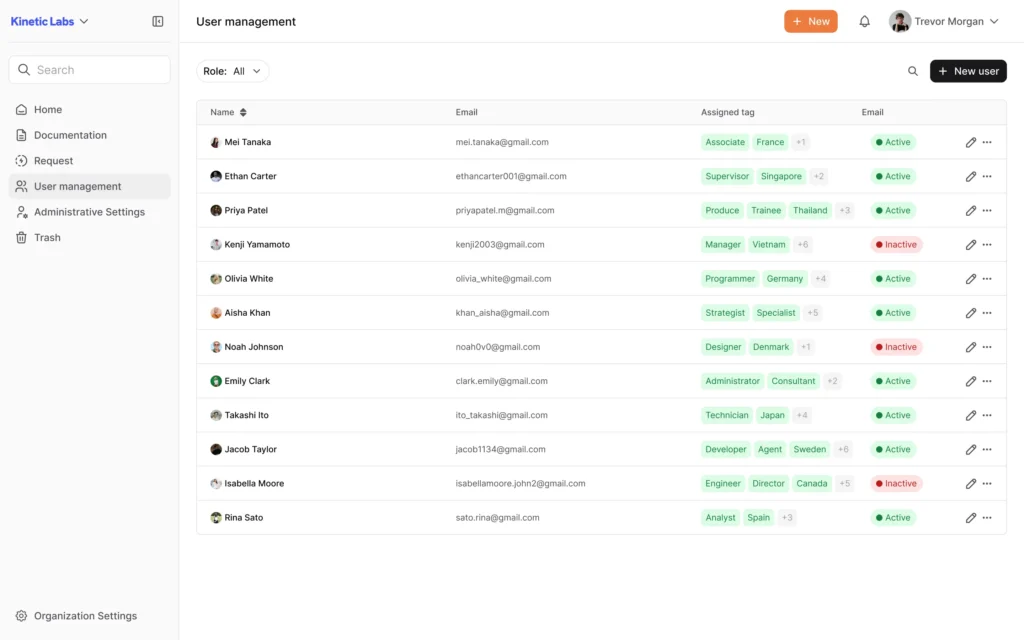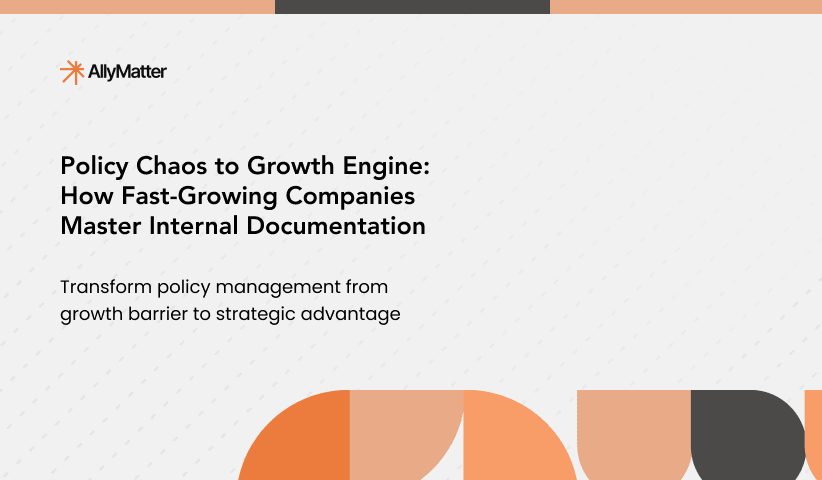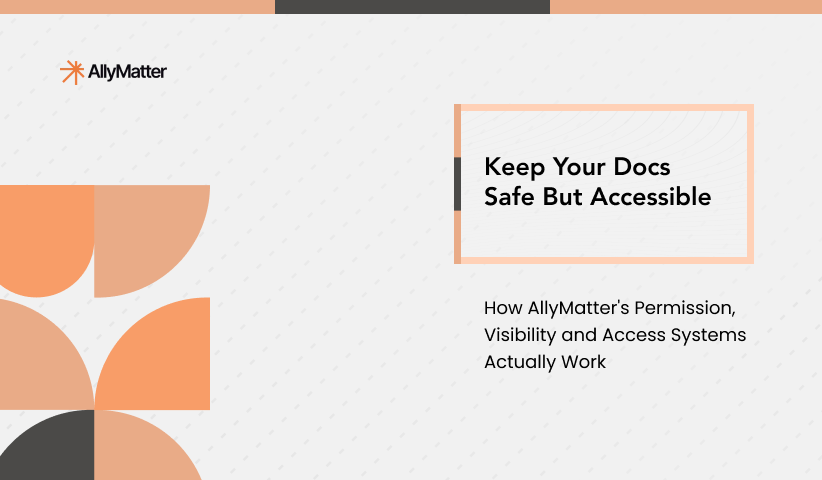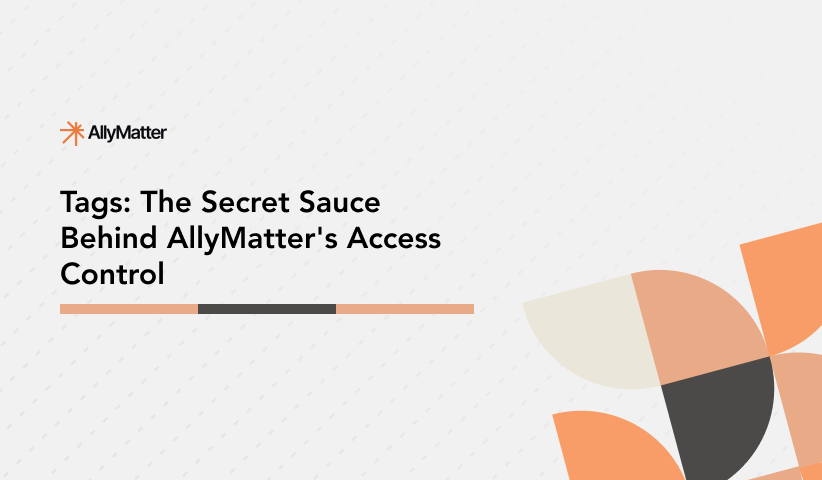What happens when a crucial client contract is buried somewhere in your email, Drive folders, and Slack channels? Everything stops while your team scrambles to find it. Meanwhile, key details about your product launch exist only in a veteran employee’s memory.
Knowledge fragmentation costs growing companies countless hours and creates risk when essential information can’t be found quickly. Worse still, critical expertise often disappears when team members transition roles or leave.
This article explores how AllyMatter’s central knowledge hub consolidates enterprise documentation into an accessible system that preserves institutional knowledge, accelerates productivity, and scales efficiently as companies grow.
The problem with scattered documentation
When scale-up companies experience rapid growth, their information infrastructure rarely keeps pace. Documents, policies, and processes proliferate across multiple platforms without consistent organization. This creates several fundamental challenges:
- Critical information becomes buried in email threads or lost entirely
- Team members develop individual workarounds and personal storage systems
- Inconsistent versions lead to confusion about which document is current
- Institutional knowledge becomes siloed in specific departments or individuals
- Compliance documentation becomes difficult to track and verify
According to research from McKinsey Global Institute, employees spend nearly 20% of their workweek searching for and gathering internal information. This translates to approximately 8 hours per week of lost productivity per employee.
Creating a single source of truth
AllyMatter’s central knowledge hub directly addresses these challenges by providing a unified platform where all company documentation lives in one searchable, organized system.
The platform centralizes:
- Standard operating procedures (SOPs)
- Departmental policies and guidelines
- Training and onboarding materials
- Product specifications and requirements
- Process documentation and workflows
- Compliance and regulatory information
Unlike scattered file systems or basic cloud storage, AllyMatter’s knowledge hub is purpose-built for documentation management with features designed specifically for growing companies.
Finding critical information instantly
Perhaps the most immediate benefit of a central knowledge base is the dramatic reduction in time spent searching for information. AllyMatter’s intelligent organization features ensure team members can quickly locate exactly what they need.
The platform enables this through:
- Smart tags and custom categories: Organize documentation by department, geography, or custom attributes for intuitive navigation
- Powerful metadata search: Find documents based on content, author, modification date, or custom fields
- Logical information architecture: Structure knowledge in ways that match how your teams actually work

For customer support teams, this might mean categorizing documentation by product area, common issues, or resolution workflows. For HR teams, it could mean organizing policies by department, employee lifecycle stage, or compliance requirements.
Preserving institutional knowledge
Growing companies face a significant risk when critical information exists only in the minds of specific team members. When these individuals leave or change roles, that knowledge often disappears with them.
Consider Sarah, a product manager who documented critical API requirements in scattered notes across three different tools. When she transitioned to a new role, her replacement spent weeks piecing together incomplete information, delaying a major product release.
AllyMatter’s knowledge hub helps organizations capture and preserve this institutional knowledge by:
- Providing an intuitive WYSIWYG editor that makes documentation simple
- Supporting rich media including images, videos, and other content which can be embedded
- Offering templates that standardize how information is captured
- Creating spaces for departmental and cross-functional documentation
Research by APQC indicates that identifying, mapping, and prioritizing critical knowledge is the top knowledge management priority for organizations, particularly as companies face growing concerns about knowledge loss due to workforce changes.
Streamlining collaboration and approvals
Documentation rarely exists in isolation. It typically requires input from multiple stakeholders and formal approval processes, especially for sensitive or compliance-related materials.

AllyMatter’s collaboration features streamline this process with:
- Smart approval flows: Automated workflows enable faster, structured approvals for critical documents
- Efficient collaboration tools: Secure commenting and feedback mechanisms
- Version control: Track changes and maintain a clear history of document evolution
- Built-in signatures: Securely sign and approve documents without leaving the platform
For product teams developing requirements documentation, this means streamlined review cycles with product managers, designers, and engineers. For legal teams managing compliance policies, it enables tracked approvals and acknowledgments from relevant stakeholders.
Ensuring security and compliance
Growing companies must balance accessibility with proper security controls, especially for sensitive information. AllyMatter’s central knowledge hub provides granular access management that ensures the right people have access to the right information.
Key security features include:
- Flexible access control: Assign document access rights tailored to roles and departments
- Document-specific permissions: Set custom visibility for sensitive materials
- Complete audit trail: Track every access and change for full accountability
- Visibility options: Configure documents as fully public, internal-only, or private
You need to configure access controls by asking:
- Who needs access to this specific document?
- Should this be department-wide or role-specific?
- Does this require approval workflows?
- What audit trail requirements apply?
An IT team might restrict access to security documentation to specific administrators while making general usage guidelines available company-wide. Meanwhile, HR could ensure compensation information remains confidential while making general benefits documentation accessible to all employees.
Scaling knowledge as you grow
As companies scale, their knowledge management needs evolve rapidly. What works for a 50-person company often breaks down at 100 or 200 team members. AllyMatter’s central knowledge hub scales alongside your organization with features designed for growing companies.
The platform supports growth with:
- User management tools: Easily add users, assign roles, and control permissions as teams expand
- Department-specific spaces: Create dedicated areas for different functions as your organization develops
- Template libraries: Standardize documentation across growing teams
- Custom branding: Align your knowledge base with your company’s unique identity

Building a knowledge-centered organization
Implementing a central knowledge hub represents more than just a technical solution—it’s a strategic shift toward becoming a knowledge-centered organization where information flows efficiently to those who need it.
Organizations that successfully make this shift experience:
- Faster onboarding for new team members
- More consistent execution of critical processes
- Better preservation of institutional knowledge
- Improved compliance and risk management
- Enhanced collaboration across departments
The most successful implementations treat knowledge management as an ongoing practice rather than a one-time project. They establish clear ownership, create regular review cycles, and continuously refine their approach based on team feedback.
Transforming documentation into strategic assets
Growing companies that centralize their knowledge management gain substantial advantages through improved efficiency, better knowledge retention, and more consistent execution. AllyMatter’s purpose-built platform transforms scattered documentation into a strategic asset that scales alongside your organization.
Ready to transform your scattered documentation into a centralized knowledge asset? Join our waitlist to be among the first to experience AllyMatter’s knowledge management platform.
Questions organizations ask about central knowledge hubs
How long does it take to implement AllyMatter’s central knowledge hub?
Implementation time depends on your existing documentation volume and complexity. Most organizations using AllyMatter start with a phased approach, centralizing critical policies and procedures first. AllyMatter’s intuitive WYSIWYG editor and smart tagging system help teams migrate content efficiently, with many seeing immediate benefits within the first few weeks of deployment.
How does AllyMatter ensure successful knowledge base adoption?
AllyMatter addresses adoption challenges through its user-friendly design and seamless workflow integration. The platform’s intelligent organization with smart tags and powerful metadata search makes finding information intuitive. Additionally, AllyMatter’s approval workflows and collaboration features naturally integrate into existing processes, encouraging regular use without disrupting established workflows.
Which documents should we prioritize for our knowledge base?
AllyMatter’s flexible structure accommodates various content types including standard operating procedures, departmental policies, training materials, product documentation, and compliance information. The platform’s rich media support allows teams to include images, videos, and interactive elements, while custom tagging enables organization by department, geography, or any business-specific categories.
How does AllyMatter integrate with our existing tools and workflows?
AllyMatter’s Central Knowledge Hub complements your existing technology stack through its flexible access controls and collaboration features. The platform’s built-in approval workflows, version control, and signature capabilities reduce dependence on multiple tools while maintaining compatibility with your current processes. This provides centralized documentation without disrupting established team workflows.
How does AllyMatter handle security and permissions for sensitive information?
AllyMatter provides granular access control that assigns document permissions by roles, departments, or specific projects. The platform includes document-specific visibility settings, complete audit trails for compliance, and flexible sharing options. This ensures sensitive information remains protected while keeping general company knowledge accessible to appropriate team members.


